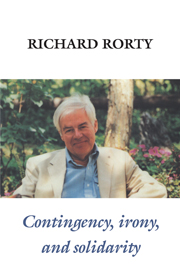4 - Private irony and liberal hope
Published online by Cambridge University Press: 05 June 2012
Summary
All human beings carry about a set of words which they employ to justify their actions, their beliefs, and their lives. These are the words in which we formulate praise of our friends and contempt for our enemies, our long-term projects, our deepest self-doubts and our highest hopes. They are the words in which we tell, sometimes prospectively and sometimes retrospectively, the story of our lives. I shall call these words a person's “final vocabulary.”
It is “final” in the sense that if doubt is cast on the worth of these words, their user has no noncircular argumentative recourse. Those words are as far as he can go with language; beyond them there is only helpless passivity or a resort to force. A small part of a final vocabulary is made up of thin, flexible, and ubiquitous terms such as “true,” “good,” “right,” and “beautiful.” The larger part contains thicker, more rigid, and more parochial terms, for example, “Christ,” “England,” “professional standards,” “decency,” “kindness,” “the Revolution,” “the Church,” “progressive,” “rigorous,” “creative.” The more parochial terms do most of the work.
I shall define an “ironist” as someone who fulfills three conditions: (1) She has radical and continuing doubts about the final vocabulary she currently uses, because she has been impressed by other vocabularies, vocabularies taken as final by people or books she has encountered; (2) she realizes that argument phrased in her present vocabulary can neither underwrite nor dissolve these doubts; (3) insofar as she philosophizes about her situation, she does not think that her vocabulary is closer to reality than others, that it is in touch with a power not herself.
- Type
- Chapter
- Information
- Contingency, Irony, and Solidarity , pp. 73 - 95Publisher: Cambridge University PressPrint publication year: 1989
- 14
- Cited by



